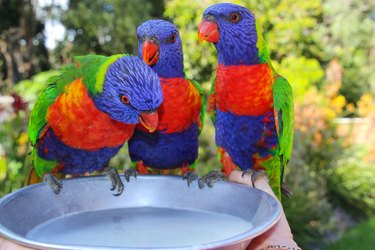Parrots are highly intelligent birds who make excellent pets with proper care. However, birds are sensitive animals and may die suddenly from ingesting toxic materials, severe emotional distress, or an undiagnosed illness. There are hundreds of species of parrots with different coloring, sizes, and personalities that you can consider. Whether you opt for more social and cuddly parrots or a more reserved bird, healthy and well-cared-for parrots can live 30 years or more depending on the species.

Video of the Day
Ingestion of toxic materials
If you go to bed with a seemingly healthy parrot in her cage and she is no longer alive in the morning, one possible reason is that she ate something toxic the day before. Educate yourself on common toxicities in the home and make sure to birdproof your home so that your parrot is never at risk from these toxic foods and materials.
Video of the Day
Avocados are toxic to birds as are some common houseplants and cut flowers, such as lilies. Be sure to check with your vet to ensure your houseplants are safe for your bird before you let your parrot out of her cage. Some other common household items that are harmful to your bird include Teflon, scented candles, incense, plug-in air fresheners, polyurethane found on some hard floors and furniture pieces, and chemical household cleaning products.
In addition, make sure all medication is secured where your bird can't get it. Monitor your parrot when she is out to make sure she doesn't chew on electrical cords or anything that may have lead paint.
Signs of illness
Birds may also die of an undiagnosed illness. Some potential illnesses that may affect your bird include proventricular dilatation disease, pulmonary sarcocystosi, and psittacosis, or parrot fever. Tumors and heart disease may also cause death in parrots.
While there are symptoms to watch for to recognize when your bird is not feeling well, in some cases, symptoms are subtle or may not appear until it is too late. Some things for which to watch include behavioral changes, changes in appetite and water intake, changes in weight, decreased energy levels, vocal changes, weakness, and difficulty staying on the perch or residing at the bottom of the cage. Beak discoloration, eye or nose discharge, and fluffed feathers are also indications that your bird is ill.
Parrot night fright
Parrots may die suddenly from night fright. This occurs when something frightens a bird at night, and he thrashes or flies around blindly. Parrots may seriously injure themselves or even die from a night fright. The causes may include headlights shining in from a car, sudden noises like dogs barking or a honking horn, or mice or cockroaches in or around the cage.
Birds suffering from night frights may fall from their perch, fly into the side of the cage, or get a wing caught, causing the wing or a blood feather to break. If the bird hits the cage at the wrong angle, it may cause death, and an untreated bleeding feather may cause a bird to bleed out and die, especially in smaller parrot species.
Since the exact cause of night fright is unknown, it can be difficult to prevent it completely. Some steps that may help include placing your bird's cage in a quiet and dark room, using heavy curtains to block light from passing cars, and playing white noise.
Determining the cause of death
Birds may also die from a respiratory blockage from stuck food, and female parrots are at risk of death from egg binding when the eggs get stuck. With so many possibilities, it may be difficult to know the actual cause of your bird's death, but if you want definitive answers, you can ask your veterinarian to perform a necropsy.
Your veterinarian can also help you decide what to do with your bird's body, and some clinics offer cremation services or can refer you to a pet cemetery. Some people bury pets outdoors in the yard or a park but be sure to check local laws before doing so, as this is illegal in some locations.